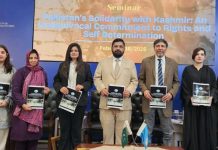ISLAMABAD, Dec 9: As parliamentarians continue to push ahead with their quest for transparency on the matter, a question was put in the National Assembly on Monday for the ministry of law, justice and human rights by a PPP lawmaker about the number of judges holding nationalities of other countries, but to no avail. Surriya Jatoi’s question was put in a category whose written answers are given but not taken up for discussion. The ministry said in its reply that it didn’t possess information sought in the question, but registrars of the superior courts had been forwarded the request.
The Supreme Court registrar said in his response quoted in the reply:
“Neither the constitution nor the code of conduct prescribed for the judges of the Supreme Court places any embargo on the honourable judges for holding dual nationality.”
Registrars of the Lahore and Peshawar high courts reproduced the same response that since the law placed no such bar, the question lacked reasoning.
The registrar of the Islamabad High Court said: “Dual nationality is no disqualification for judges of this court under any law of the country; hence the information sought is regretted.”
Reply is still awaited from the Sindh and Balochistan high courts.
However, the Federal Shariat Court clarified, citing its record, that no judge, including its chief justice, held dual nationality.
A similar question has been asked in the Senate more than once. Failing to receive a satisfactory answer, the mover of the question, Senator Farhatullah Babar of the PPP, has once again sought a clarification during the ongoing session of the house from the ministry as to why it had failed to get the required information.
He argued that even if the constitution and the relevant code of conduct don’t prohibit the judges from securing nationality of another country, what stopped them from making this information public.
The Senate is also discussing the procedure for the appointment of judges. Senators from PPP argued in a motion that the procedure lacked parliamentary oversight in its present form.
According to Kamran Murtaza, president of the Supreme Court Bar Association, the SCBA is not in a position to comment on the matter.
“If parliament passes a legislation which places a similar condition for the judges, the SCBA will support that,” he said.
The SC, through a landmark ruling in September last year, had declared lawmakers holding dual nationality disqualified. Following the ruling, many legislators lost their seats. In the general elections, candidates were asked to declare on oath that they did not hold foreign nationalities.
With the disqualification of a number of lawmakers, questions are regularly being raised if the same condition should apply to civil servants and members of the superior courts.
The Awani National Party, through a private member’s bill presented in the Senate, has sought an amendment to the constitution for barring civil servants in BS20 and above from keeping foreign nationalities.











